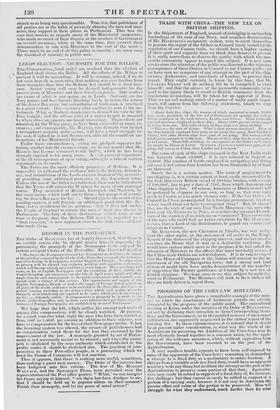REFORM IN THE POST-OFFICE.
THE Duke of RicmioNu has at length discovery'', that there is no earthly reason why he should render himself unpopular by patronizing the monopoly of the Newspaper trade enjoyed by certain overpaid Clerks of the Post-oflice. The Timos tell us, that " Ins; Grace the Postmaster-fieneral has determined On abolishial. the whole of the privileges enjoyed by the Clerks of the Post-office as regards the transmission of or dealing in Newspapers, whether English or Foreign. No other class of persons will be allowed any exclusive privilege with regard to such trade ; which will become entirely open awl free in every respret. The -e privilege: will cease, so far as English Newspapers and the circulation of them within the United Khoolom are concerned, on the 5th of April next ; which will allow ample time for such arrangements as the public convenience will demand, connected with a change of this natme. the transmission and supply of the English Newspapers abroad, as well as the supply of 1'o-reign Newspapers frank all parts of the world, will cease ti be ilicholed in the Post .office pi ivileges, at periods valying according to the distance from which such pmers al; to he obtaiued, or to which they are required to be sent ; which peri.,ds are imt yet, we ',cll.', e, definitely settled. A compensation is proposed to he made t, ;he Clerks of the Post-office, only in those cases wherein their privileges, as in the iustauce of Foreign Newspapers, are established by an act of Parliament."
We hope that the bill, which settles the amount and =do of paying this compensation, will be closely watched. At present, we cannot conceive what right the men who have been receiving from 00/. 10 1,400/. per annum in addition to their salaries, can have to compensation for the loss of their Newspaper traffic. When the licensing system was altered, the owners of publichouses had no compensation voted them for the loss they sustained by the huprovement of the law. A monopoly granted by act of Parliament is not necessarily meant to be eternal; and when the monopoly is abolished by the same authority which established it, the profits under it should be abolished also. The granting of compensation to these Post-office people, is a proceeding which we trust the house of Commons will not sanction.
Thus it appears, that there is nothing more useful, sometimes, than making a great man uneasy. The Duke of RICHMOND has been badgered into this reform, The fear of Mr. ROBERT WALLACE, and the Newspaper Press, have prevailed over the representations of the Pest-office gentry. " What," we can imagine his Grace saying to himself, " are these low-born drudges to me, that I should be held up to popular odium on their account? Perish their monopoly, and let my peace of mind return!"


















 Previous page
Previous page